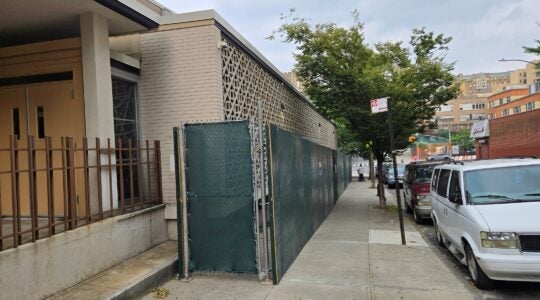For two years, the Orthodox Union’s Emerging Jewish Communities Fair has posed the question: Are you willing to move? To a small community? To switch your children’s schools? Move away from your family?
This year, it may be a little easier to say yes, as eight of the 38 communities presenting at the event on March 27 are just a short drive away from New York City — four in northern New Jersey, four in Nassau County, L.I. Also included is Staten Island, one of the five boroughs.
Originally, the fair was created to “help grow out-of-town communities,” said Frank Buchweitz, director for community services at the OU. But “all the local communities” — who are also struggling for membership — “say, ‘but we’re here in the backyard.’”
“These are alternatives to areas that might be very high priced,” said Buchweitz, who himself moved out of Riverdale 12 years ago, to a home in Wesley Hills, in Rockland County. “With the economy the way it is,” he said, “people just can’t afford expensive houses. You can get a house in one of these towns for $150,000, that would be over $500,000 in one of the [bigger Jewish communities in the] suburbs of New York.” More than 1000 people are expected to attend the third iteration of the fair, which will be held at the Grant Hyatt hotel.
For families who are intimidated by a move to Louisiana, Nevada or Texas, a small community with affordable housing and rich financial incentives may be just a short drive away.
In Linden, N.J., a suburban community about 30 minutes outside of Manhattan, a $10,000 incentive package has already drawn in many young couples. “It’s a very effective tool, especially in the current economic climate,” said Rabbi Joshua Hess of Congregation Anshe Chesed, the synagogue that is offering the funds.
The 120-member family synagogue was one of the first to provide financial incentives for young families, says Rabbi Hess, who referenced a news article that dated back to 1997. “It really picked up steam around 2005,” said the young rabbi, who has been the spiritual leader of the congregation since 2009. More than 15 young families have moved in to the area in the past five years, most of whom still remain there. The $10,000 from the synagogue, which comes from internal shul funds, becomes a gift once a family remains in the town for five years.
Dovid and Leah Helfgott moved to Linden seven years ago, becoming only the fourth couple to do so. After they got married, the pair bought an apartment in Teaneck, N.J., the burgeoning Modern Orthodox community. “For most of the two years there,” said Dovid Helfgott, 29, the couple drifted between two different, large synagogues nearby. “We just went to daven,” he said. “We didn’t even know anything about membership.”
When Leah was pregnant with their first child, “it got us thinking about smaller communities,” said Helfgott. “Housing is much cheaper, and your dollar goes further,” he said. It “unlocked our thinking from only looking in Teaneck or only looking in West Hempstead [L.I.],” another growing Modern Orthodox neighborhood.
With both of their parents and Dovid’s work at the time in New York, Linden seemed to offer the best of both worlds. After finding the synagogue’s website from the OU, and learning about the incentive program, the couple spent Shabbat in the community and were hooked.
“It tickled our fancy in that regard,” said Helfgott, “going to a smaller place, mattering, being a part of a shul and helping it grow.” Today, the Helfgotts have two children, ages 6 and 2, and Dovid is the president of the synagogue.
Elizabeth, Springfield and Parsippany — all in Northern New Jersey — are also hoping to attract new members at the OU fair, with pitches offering tuition breaks, free synagogue membership and job placement assistance.
Buying a house in Springfield could turn out to be very affordable, especially if families take advantage of the $20,000 incentive that Congregation Israel is offering. The Modern Orthodox synagogue began its incentive program last month, offering families who move within the first year the full amount, $15,000 for those in the second year and $10,000 for families who join the community after that.
“It is obviously a bigger deal” to move when there are only a few young families, said Ben Hoffer, chair of the membership committee at the synagogue. The full amount of the incentive would become a gift after seven years in the community; for families who leave before that, the amount would be prorated.
The 150-member-family synagogue has about 15 young couples currently living there. “We had some growth,” said Hoffer, “but we wanted to quicken the pace. We thought this incentive program would help get us where we want to be.” With internal funds raised to offer incentives to up to 27 families, the synagogue is eager for applications to roll in. Several families have already submitted applications, and Hoffer is confident Springfield will be the right community for many.
“We have all the infrastructure already in place,” said Hoffer, who moved to the neighborhood in 2007. “A mikveh, a beautiful shul, a great rabbi … you’re not moving somewhere where you have to build from scratch.”
If the Garden State still doesn’t hold any appeal, communities in Long Island —including Plainview, Oceanside, Roslyn and Merrick — are trying to lure new members with incentive programs of their own.
In Plainview, the Young Israel is offering a $25,000 interest-free loan to young families moving in.
“Even though we’re close to New York City and a lot of people in the shul work there,” said Rabbi Weissman of the Young Israel of Plainview, “we have more of a mixed bag in terms of people; it’s a very embracing and warm community.”
Last year, an anonymous donor to the synagogue offered $500,000 for the incentive program, hoping to continue the synagogue’s growth even in the bad economy. With 165 member families, the synagogue can give out 20 interest-free loans, with the hope that it will be self-perpetuating every 10 years, when the loans are repaid.
“It’s kind of a way of reinvigorating the community every 10 years,” said Rabbi Weissman. Four couples have already been approved for a loan to move to the community, which is awarded once a family closes on a house.
Michelle and Asael Meir, who have two children under age 2, moved to Plainview last Fall toward the end of last year.
“It was one of the first places we started to look,” said Michelle Meir, who grew up in Queens and lived there with her husband when they got married. But when they decided to move, Plainview’s cheap housing prices and the “the reputation that they had for a great Modern Orthodox Jewish community” sealed the deal. Plus, the proximity to her husband’s job, Meir said. “Those three factors landed us there.”
And while Meir was concerned about moving away from her mother in Queens, “everybody [in Plainview] was so amazing and so welcoming,” she said. When the Meirs had their second child two months ago, “every day for three weeks I had dinner made for me.”
And on the South Shore of Long Island, Oceanside, a community that many associate with a strong Jewish population, is also offering financial inducements to young families.
“The community has gotten older,” said Buchweitz of the OU. “They want to incorporate younger couples.”
And so far, the Young Israel of Oceanside has been fairly successful. Currently the synagogue has almost 200 families, 35 of whom have moved in since they started their initiative in 2007.
“A lot of communities have tried offering incentives,” said David Welner, chairman of the synagogue’s growth initiative. “As far as I know, Oceanside is one of the very few that has really succeeded.”
The incentives the synagogue offers are not just tied to home ownership, but to real involvement in the synagogue. A $5,000 interest-free loan is available for families dedicated to leadership within the community, of which about half of the new members have taken advantage.
“We work very hard at integrating young families,” said Welner, “giving them a real voice in the running of the shul…they become the future leaders of Oceanside.”
Ultimately, the success of Oceanside’s initiative lies in the community as a whole, and not just the financial incentives, according to Welner. “It’s the total package,” he said. “It’s not strictly just about the money.”
E-mail: amy@jewishweek.org
The New York Jewish Week brings you the stories behind the headlines, keeping you connected to Jewish life in New York. Help sustain the reporting you trust by donating today.




